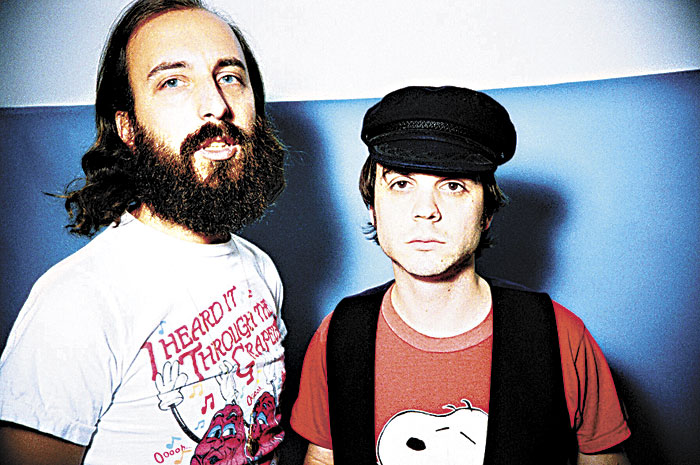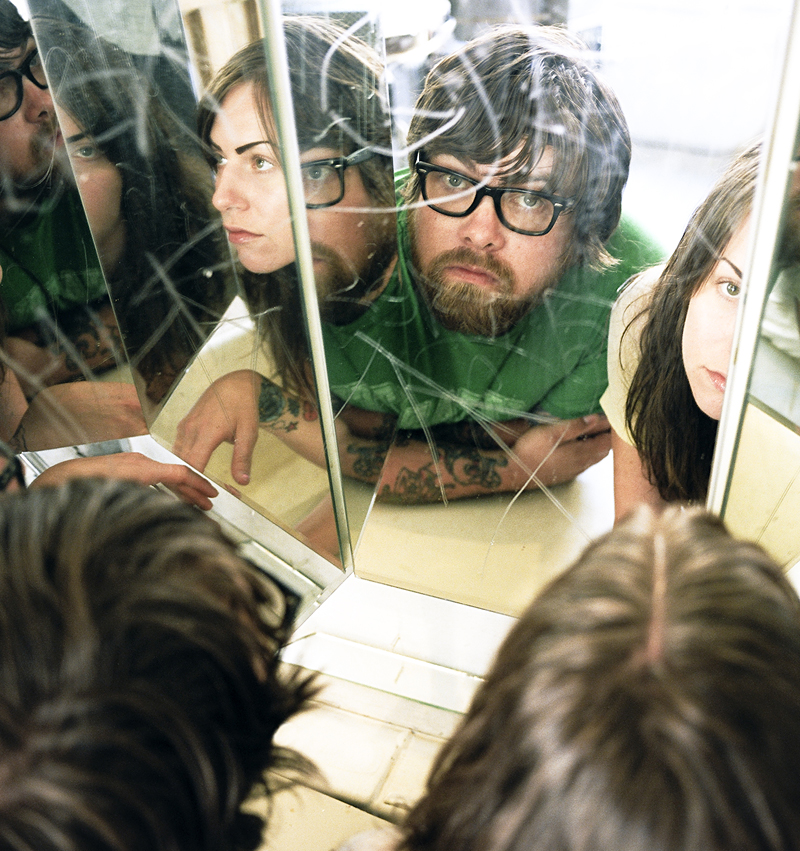Three years ago, in the smoky, crowded basement of a charming Parisian dive called Le Popin, I made one of the best musical discoveries of my life: a two-man French pop band called Herman Dune. Accompanied only by bandmate Néman’s bongos, songwriter David-Ivar played a cheap guitar and sang a series of quirky, arrestingly sincere pop songs about loneliness and displacement that touched me, a burned-out foreign student contemplating dropping out of college, in a way few artists have.
I later found out that the band I thought I’d “discovered” had been quietly, unobtrusively putting out incredibly clever, spare folk records for the better part of a decade (a third member, David’s brother, André, left the band in 2006). In Europe, where the band has had record-label promotional support and the enthusiastic endorsement of the BBC’s late, great John Peel, they’ve done quite well. But in all that time they’ve never had a U.S. label with the resources to distribute or promote their music properly; American fans have mainly found Herman Dune via word-of-mouth and the Internet.
Fortunately for us, that’s not the case anymore. Thanks to Everloving Records (host to Inara George and Canadian electrorockers Metric, among others), Herman Dune will finally receive some much-deserved exposure on this side of the Atlantic. On October 21, the band will release their first full-length on Everloving, Next Year in Zion.
In what little American press they’ve received, critics regularly describe Herman Dune’s music as “anti-folk.” The nomadic band lived in New York City for a period, where David-Ivar and Néman performed regularly with “anti-folk” artists like Kimya Dawson, Turner Cody, and Jeffrey Lewis. “I have two feelings about [the word “anti-folk”],” David explains. “Most of our best friends who are musicians are in the scene, and we’ve played with them, and when we lived in New York, they were our scene.Jeffrey Lewis, Kimya Dawson, Turner Cody…they are family to us, and we love playing with them, so every time I hear “anti-folk,” I’m happy.It’s like if someone said you come from that neighborhood.” But then again, he adds, “As soon as you get out of New York, I’ve noticed that people think anti-folk is a kind of music, or a way to write songs, and I’ve never really thought of it that way. I don’t know what the word means, first, and neither Néman nor I feel like we belong to a type of music—except for maybe rhythm and blues or rock and roll.”
Most likely the label “anti-folk” stems from the playful sort of storytelling style that is the sole common thread binding Herman Dune’s music to that of their “anti-folk” collaborators. After all, David muses, “Someone who listens to us, he would find it hard to think our music [sounds] close to Kimya Dawson’s, although her music is very good.” But as in Dawson’s songs, Herman Dune’s unusual juxtaposition of conversational literalisms and whimsical flights of fancy culminate in an expression of human emotion, of some deep metaphysical truth.
Take this example from Next Year in Zion‘s “My Best Kiss”: “You said there was a man on the train who’d been drinking/And he asked you if you’d ever lied/He said if you have, then God will keep you from sinking/And you just kicked him in the eye.” It’s a little like listening to a European incarnation of the Silver Jews. Really, “anti-folk” is just folk, written by and for a new generation of lonely cynics in search of meaning; it’s less an attempt to subvert traditional folk than a 21st-century reinvention of a genre that, in Herman Dune’s case, is influenced more by Chuck Berry and Leonard Cohen than Bob Dylan and Joan Baez.
“The idea for me, and the way I see our band, is that we trust the writing skills enough to think there’s enough personality in them so that we could play the music we want to play after,” David says.
That music is not limited to the bare-bones guitar/vox/percussion combo with which the band began. Herman Dune’s work of late—from their 2007 EP I Wish I Could See You Soon to Next Year in Zion—includes female backing vocals and a horn section (unusual in folk music, “anti” or not). But on Monday night, Herman Dune will perform at the Triple Door as they did in that basement in Paris.
“Live, we still play straight, bare bluesy guitar-and-drum arrangements,” David says. “For people who have the records, they can hear how the song was written originally, without horns or backing vocals. I like touring with the big band with nine people on stage. It’s cool; it gives you a feeling of power. But when you’re a duo onstage, you have this feeling of intimate truth with the people. That is kind of nice.”






